Gujarat Board GSEB Solutions Class 10 Sanskrit Chapter 3 स्वस्थवृत्तं समाचर Textbook Exercise Important Questions and Answers Notes Pdf.
Gujarat Board Textbook Solutions Class 10 Sanskrit Chapter 3 स्वस्थवृत्तं समाचर
GSEB Class 10 Sanskrit स्वस्थवृत्तं समाचर Textbook Questions and Answers
1. अधोलिखितेभ्यः विकल्पेभ्यः समुचितम् उत्तरं चिनुत
Choose the correct answer from the given alternatives:
1. बालः किं समाचरेत्?
(क) भ्रमणम्
(ख) स्वस्थवृत्तम्
(ग) कार्यम्
(घ) सौस्यम्
उत्तरम्:
(ख) स्वस्थवृत्तम्
2. किं कृत्वा स्नानं समाचरेत्?
(क) भोजनम्
(ख) पठनम्
(ग) तैलमर्दनम्
(घ) व्यायामम्
उत्तरम्:
(ग) तैलमर्दनम्
![]()
3. त्वं मित्रैः ………… पाठशाला गच्छ।
(क) परितः
(ख) समम्
(ग) ऋते
(घ) पुरतः
उत्तरम्:
(ख) समम्
4. शत्रोरपि गुणाः ……….।
(क) ग्राह्याः
(ख) त्याज्याः
(ग) हेयाः
(घ) ध्येयाः
उत्तरम्:
(क) ग्राह्याः
5. जनैः किं ध्येयम्?
(क) सुखम्
(ख) दुःखम्
(ग) ब्रह्म
(घ) जनसेवनम्
उत्तरम्:
(क) ग्राह्याः
6. कथम् आसीनेन सन्ध्याविधिः करणीयः?
(क) दक्षिणाभिमुखेन
(ख) उत्तराभिमुखम्
(ग) पश्चिमाभिमुखेन
(घ) पूर्वाभिमुखेन
उत्तरम्:
(घ) पूर्वाभिमुखेन
![]()
2. एकवाक्येन संस्कृतभाषायाम् उत्तरं लिखत
Answer in one Sanskrit sentence:
1. प्रातःकाले कं स्मरे?
उत्तरम्:
प्रातःकाले जगद्विधातारं स्मरेत्।
2. कीदृशं जलं पिबेत्?
उत्तरम्:
शुद्ध जलं पिबेत्।
3. कीदृशः तातः पुत्रं समादिश?
उत्तरम्:
पुत्रहिते रतः तातः पुत्रं समादिशम्।
4. कस्य संसर्गं त्यजेत्?
उत्तरम्:
दुर्जनस्य संसर्गं त्यजेत्।
5. किं कृत्वा उत्तरं देयम्?
उत्तरम्:
प्रविचार्य (सम्यक् चिन्तयित्वा) उत्तरं देयम्।
![]()
3. पुरुष वचनानुसारं धातुरूपैः रिक्तस्थानानि पूरयत् –
Fill in the blanks with the correct forms of the verbs according to person and number:
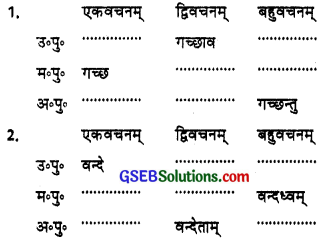
उत्तरम्:
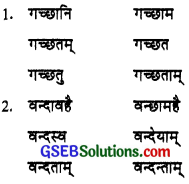
4. वचनानुसारं शब्बनपैः रिक्तस्थामानि पूरयत –
Fill in the blanks with the correct forms of the words according th number:
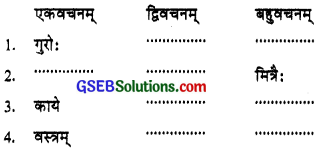
उत्तरम्:
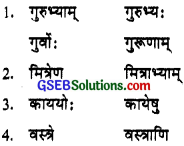
5. अधोलिखिताना प्रश्नानाम् उत्तराणि आपलभाषायां लिखत –
Answer the following questions in English:
1. Write your day-to-day routine on the basis of this poem.
Answer:
If anyone gets early in the morning one should think about health. Thereafter remembering God, the creator of the world, one should drink pure water. Walking a little distance, go to the toilet. Washing hands. One should take proper exercise. Then it will be better to massage the body with oil before taking a bath. Washing own clothes after taking a bath is desirable. Then facing the east, one should sit for सन्ध्यावन्दन – morning prayer. This should be followed by paying respect to parents and eating breakfast. A boy should then go to school and learn the lesson with friends.
In this regards, one should always avoid the company of the wicked and seek the company of the good. Generally, it is a good policy to endeavour to attain religious merit and remember God. Think well before replying a question. Good qualities should be accepted even from enemies. Bad points or habits should be given up. It is no use wasting time in worrying about problems that we may encounter in a distant future. Enjoying good health and innocent pleasures, one should also spare time for social service.
![]()
2. Change the verb used in potential mood in the poem into potential participle.
उत्तरम्:
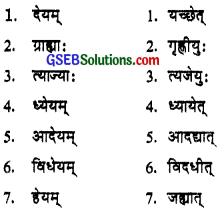
GSEB Class 10 Sanskrit स्वस्थवृत्तं समाचर Additional Important Questions and Answers
Question 1.
What is the meaning of the word जगत् विधाता।?
Answer:
जगत् विधाता। is a compound word that can be explained as जगतः विधाता। It means the creator of the world. It refers to the ultimate reality (परब्रहा) taking the three forms En, from ब्रम्हा विष्णु and शिव
Question 2.
What is meant by the word ‘Farremana?
Answer:
स्वस्थवृत्तम् is compound that is explained as स्वस्थम् च तत् वृत्तम् – कर्मधारय समास। The behaviour or routine (वृत्तम्) that is conducive to health (स्वस्थ) is an important topic.
Question 3.
What is meant by the words ‘tat: त्याज्याः गुरोः अपि?
means teacher, preceptor as well as the elderly person. Now since elders and teachers are human beings. They are bound to have some vices, imperfections. The vices of even a teacher or elderly person should be given up. Whatever is good in us should be accepted.
![]()
4. अधोदत्तानां पद्यानाम् आङ्ग्लभाषायाम् अनुवाद कुरुत –
Translate into English of the following verses.
1. प्रविचार्योत्तरं देयं सहसा न वदेः क्वचित्।
शत्रोरपि गुणाः ग्राह्या दोषास्त्याज्याः गुरोरपि।।
Answer:
The answer should be given after thinking thoroughly well. Never should you speak suddenly or thoughtlessly. Good qualities should be accepted even from the enemy. Bad qualities even of the teacher should be given up.
2. ध्येयं सनातनं ब्रह्म हेयं दुःखमनागतम्।
कायिकं सुखमादेयं विधेयं जनसेवनम्।।
Answer:
Eternal supreme being should be meditated upon. Give up sorrow that has not come. Accept the physical pleasure. Service should be rendered to people.
5. कोष्ठकगतपदानि प्रयुज्य अधोलिखितानां वाक्यानां संस्कृतानुवादं कुरुत –
Choose the correct word from the brackets and translate following sentences into Sanskrit:
1. Child, get up from bed.
(वत्स शय्या उद् रु स्था)
2. All of you drink pure water.
(युष्मद् सर्व शुद्ध जल पा)
3. In the morning always take exercise.
(युष्मद् नित्य प्रभात व्यायाम कृ)
4. Practise morning/evening prayer facing the east.
(पूर्वाभिमुख आस् सन्ध्याविधि कृ)
5. Service to people should be done by you.
(लोकसेवा कृ युष्मद्)
Answer:
1. हे वत्स, त्वं शय्यायाः उत्तिष्ठ।
2. यूयं सर्वे शुद्ध जलं पिबत।
3. त्वं नित्यं प्रभाते व्यायाम कुरुत।
4. पूर्वाभिमुखम् आसीनः त्वं सन्ध्याविधिं कुरु।
5. त्वया लोक सेवा कर्तव्या।
![]()
स्वस्थवृत्तं समाचर Introduction
Generally speaking आयुर्वेद has two sections parretera (regimen for a healthy life) and आतुरवुथारम् (study of diseases and treatment). Out ancient medical science gives more stress on the prevention of diseases. Since body and mind are inseparable integral whole, the introductions given in this lesson are for physical as well as mental or spiritual wellbeing. You must have heard the proverb ‘sound mind in sound body’ or the Sanskrit line चित्ते प्रसन्ने, भुवनं प्रसन्नम्। Meditation or remembrance of God is important because it makes our mind calm and quiet which in turn helps our body to maintain good health. The rules prescribed should be observed in spirit and not in letter.
स्वस्थवृत्तं समाचर Summary Of The Chapter
These are said in the chapter that O child, get up from bed; practise well the behaviour conducive to health, remember the creator of the world. Then drink pure water. And all the people should do walking a distance of hundred steps after going out of the house go quickly for evacuation of bowels. Then washing the hands (lit making them pure) with soap, take exercise regularly.
You should massage your body with oil, then take your bath. Wash your own garment in the right manner and also perform the morning ritual sitting facing the east. Always bow down to the parents and then eat your morning meal and take your breakfast. You should go to school with your friends and learn lessons. The father who was engrossed in the welfare of his son instructed him in this way.
You should give up the association with the wicked. Prefer the company of good people. Remember the name off throughout day and night. Secure religious merit. And the answer should be given after thinking thoroughly well. Never should you speak suddenly or thoughtlessly. Good qualities should be accepted even from the enemy. Bad qualities even of the teacher or elderly person should be given up. Eternal supreme being should be meditated upon. Give up thinking about sorrow that has not come. Accept or physical pleasure. Service should be rendered to people.
![]()
स्वस्थवृत्तं समाचर Prose-Order, Translation And Glossary
1. बाल उत्तिष्ठ शय्यातः स्वस्थवृत्तं समाचर।
स्मर जगद्विधातारं ततः शुद्धं जलं पिब॥1॥
Prose – order: (हे) बाल, शय्यातः उत्तिष्ठ। स्वस्थ वृत्तम् समाचर, जगद्विधातारम् स्मर। ततः शुद्धम् जलम् पिब।
Translation: 0 child, get up from bed; practise well the behaviour conducive to health, remember the creator of the world. Then drink pure water.
Glossary: शय्यातः – from the bed; suffix त: added to the noun शय्या, पाठशालात: – from school, मन्दिरतः – from the temple, उत्तिष्ठ – get up, उद् + स्था – imperative mood, लोट् लकार – second person singular, verb of the subject त्वम्, स्वस्थवृत्तम् – स्वस्थम् च तत् वृत्तम् च – कर्मधारय समास — healthy behaviour, समाचर – practise (आचार) well (सम् + सम्यक्) सम् + आ + चर् imperative mood, लोट् लकार second person singular, verb of the subject त्वम्, जगद्विधातारम् – creator of the world, जगतःविधाता, तम् – षष्ठी तत्पुरुष समास; object of the verb स्मर, स्मर – (you) remember स्मृ imperative mood, लोट् लकार, second person singular, verb of the subject त्वम्, ततः – then, after that; this is an indeclinable, शुद्धम् जलम् – pure water, object of the verb पिब, पिब – (you) drink पा – पिब् । imperative mood लोट् लकार, second person singular, verb of the object त्वम्।
![]()
2. शतं पदानि निष्क्रम्य शौचार्थं गच्छ सत्वरम्।
फेनिलेन करौ कृत्वा शुद्धौ व्यायाममाचर॥2॥
Prose-order: शतम् पदानि निष्क्रम्य (त्वम्) शौचार्थम् सत्वरम् गच्छ। फेनिलेन करौ शुद्धौ कृत्वा व्यायामम आचर।
Translation: Walking a distance of hundred steps after going out of the house go quickly for evacuation of bowels. Then washing the hands (lit making them pure) with soap, take exercise.
Glossary: शतम्-पदानि – hundred steps, निष्क्रम्य – going out, निस् + क्रम, शौचार्धम- शौचाय इति – चतुर्थी तत्पुरुष समास, for evacuation of bowels; शौचम् is an abstract noun from the adjective, शुचि – and literally means purification, सत्वरम् – त्वरया सह यथा स्यात् तथा – अव्वयीभाव समास; quickly; this is an adverb modifying the verb, गच्छ – गच्छ – go, गम् – गच्छ – imperative mood, लोट लकार second person singular, verb of the subject, त्वम्, फेनिलेन – with a soap, करौ – both the hands, शुद्धौ कृत्वा – cleaning, कृ धातु क्त्वा प्रत्ययः, शुद्धौ is the adjective of करौ, व्यायामम् – exercises; object of the verb, आचर so in the accusative case, आचर (you) do, practise, here take; आ + चर imperative mood, लोट लकार, second person singular, verb of the subject, त्वम् which is understood.
![]()
3. तैलं मर्दय काये त्वं ततः स्नानं समाचर।
यथाविधि जलेनैव वस्त्रं स्वीयं प्रधावय॥3॥
Prose-order: त्वम् काये तैलम् मर्दय, ततः स्नानम् समाचर। जलेन एव यथाविधि स्वीयम् वस्त्रम् प्रधावय।
Translation: Massage (your) body with oil, then take (your) bath. Wash your own garment in the right manner.
Glossary: काये – into the body, काय (Masculine noun ending in अ) locative singular, तैलम् – oil, मर्दय – rub, massage, मर्द causal imperative mood, प्रेरक लोट् लकार, second person singular, जलेन एव – with water only, यथाविधि-विधिम् अनुसृत्य। अनतिक्रम्य – अव्वयीभाव समास, स्वीयम् वस्त्रम् – own garment, toilet is an adjective formed from to and it means belonging to self, other such adjectives are मदीय (mine), त्वदीय (yours), तदीय (his), राष्ट्रिय (national), etc., प्रधावय – wash (धावय) in the right manner (प्र), प्र + धाव् causal imperative, प्रेरक लोट् लकार second person singular, verb of the subject त्वम्।
![]()
4. पूर्वाभिमुखमासीनः कुरु सन्ध्याविधिं तथा।
वन्दस्व पितरौ नित्यं प्रातराशम् अशान च॥4॥
Prose-order: तथा पूर्वाभिमुखम् आसीनः (त्वम्) सन्धाविधिम् कुरु। नित्यम् पितरौ वन्दस्व प्रातराशम् च अशान।
Translation: And also perform the morning ritual sitting facing the east. Always bow down to the parents and (then) eat your morning meal. (Take your breakfast).
Glossary: तथा – similarly, an indeclinable used in the sense of and also, so also’, पूर्वाभिमुखम् – facing the east; this is an adverb, आसीनः – sitting, आस् present active participle, masculine nominative singular, adjective of, ‘त्वम्’, सन्ध्याविधिम् – here ‘morning prayer’ : विधि means rite or ritual, कुरु (you) perform, कृ imperative mood, लोट् लकार second person singular, verb of the adject, त्वम् active voice; त्वं सन्ध्याविधि कुरु, passive voice : त्वया संन्ध्याविधिः क्रियताम्। नित्यम् – always, पितरौ-माता च पिता च- एकशेष द्वंद्व समास; so called because only one (एक) mother and father, वन्दस्व – (you) bow down वन्द imperative mood, लोट् लकार second person singular, verb of the subject, ‘त्वम्’ प्रातिराशम् – morning meal, breakfast, प्रातराश (masculine noun ending in अ) accusative singular, अशान – (you) eat, अश् imperative mood, लोट् लकार, second person singular verb of the subject, त्वम्, गृहाण (ग्रह), बधान (बन्ध), मथान (मन्थ्) and पुषाण (पुष्)।
![]()
5. पाठशाला समं मित्रैः गच्छ पाठं तथा पठ।
एवं समादिशत् पुत्रं तातः पुत्रहिते रतः॥5॥
Prose-order: मित्रैः सम् (त्वम्) पाठशालाम् गच्छ। तथा पाठम् पठ। एवम् पुत्रहिते रतः तातः पुत्रम् समादिशत्।
Translation: Go to school with your friends and learn lessons. The father who was engrossed in the welfare of his son instructed him in this way.
Glossary: मित्रै समम् – with friends, रामेण सह (साधर्म, साकम्, समम् वा) जानकी वनं प्रस्थिता। पाठशालाम् Togg – go to school; when the root 14 or any other rood of the same meaning or denoting motion is used the word denoting place is in the accusative case so 4691SIH is in the accusative case, पाठम् पठ – learn (your) lessons, एवम् – in this way, thus, this is an indeclinable, पुत्र हिते – पुत्रस्य हितम्, तस्मिन्-षष्ठी तत्पुरुष समास in the welfare, रतः – engrossed, engaged, पुत्रहिते रतः is an adjective of the noun, तातः समादिशत् – instructed सम् + आ + दिश् imperfect past tense, लङ् लकार third person singular.
![]()
6. त्यज दुर्जनसंसर्ग भज साधुसमागमम्।
कुरु पुण्यमहोरात्रं स्मर नाम हरेः सदा॥6॥
Prose-order: (त्वम्) दुर्जनसंसर्गम् त्यज, साधुसमागमम् भज, अहोरात्रम् पुण्यम् कुरु, सदा हरेः नाम स्मर।
Translation: Give up the association with the wicked. Prefer the company of good people. Remember the name of all throughout day and night. Secure religious merit.
Glossary: दुर्जनसंसर्गम् – association with wicked, दुष्टः जनः दुर्जनः – प्रादितत्पुरुष समास, दुर्जनस्य संसर्गः – षष्ठी तत्पुरुष समास; object of the verb त्यज, त्यज – given up त्यज् imperative mood, लोट् लकार second person singular verb of the subject त्वम्, साधुसमागमम् – साधोः समागमः, तम्-षष्ठी तत्पुरुष समास company of good people, भज – prefer enjoy accept, भज imperative mood, लोट् लकार second person singular, अहोरात्रम्-अजः च रात्रिः च एतयोः समाहारः-समाहर द्वंद्व समास day and night, पुण्यम् कुरु – secure religious merit, हरे: नाम – the name of, हरि स्मर – remember, स्मृ – imperative mood, लोट् लकारsecond person singular, verb of the subject त्वम्।।
7. प्रविचार्योत्तरं देयम् सहसा न वदेक्वचित्।
शत्रोरपि गुणाः ग्राह्या दोषास्त्याज्याः गुरोरपि॥7॥
Prose-order: प्रविचार्य उत्तरं देयम्, क्वचित् सहसा न वदेः, रात्रोः अपि गुणाः ग्राह्याः, गुरों: अपि दोषाः त्याज्याः।
Translation: Answer should be given after thinking thoroughly well. Never should you speak suddenly or thoughtlessly. Good qualities should be accepted even from the enemy. Bad qualities even of the teacher (or elderly person) should be given up.
Glossary: प्रविचार्य – thinking well प्र + वि + चर्, ल्यबन्त – gerund, उत्तरम् – answer reply; object of the potential passive participle देयम्, देयम् – should be given, क्वचित् न – never; क्वचित is an indeclinable, सहसा – suddenly, thoughtlessly; this is an indiclinable, न वदेः – should not talk; वद् विधिलिङ्ग लकार second person singular, शत्रोः – of the enemy, गुणाः – virtues, good points, ग्राह्याः – should be accepted, ग्रह कर्मणि विध्यर्थक कृदन्त, गुरोः – of the teacher or elderly person, त्याज्याः – should be given up or discarded:, त्यज् – masculine nominative plural adjective of दोषाः।
![]()
8. ध्येयं सनातनं ब्रह्म हेयं दुःखमनागतम्।
कायिकं सुखमावेयं विधेयं जनसेवनम्॥8॥
Prose-order: सनातनम् ब्रह्म ध्येयम्, अनागतम् दुःखम् हेयम्, कायिकम् सुखम् आदेयम्, जनसेवनम् (च) विधेयम्।
Translation: Eternal supreme being should be meditated upon. Give up (thinking about) sorrow that has not come. Accept (enjoy) the physical pleasure. Service should be rendered to people.
Glossary: सनातनम् ब्रह्म – eternal supreme being, ध्येयम् – should be meditated upon, ध्यै – कर्मणि विध्यर्थक कृदन्त, अनागतम् – न आगतम् – नञ् तत्पुरुष समास; which has not come, हेयम् – त्याज्यम् – should be given up, कर्मणि विध्यर्थक कृदन्त, कायिकम् – physical; adjective formed from the noun काय, आदेयम्-ग्राह्यम्; should be accepted, जनसेवनम् – जनानाम् सेवनम् – षष्ठी तत्पुरुष समास; service of the people, विधेयम्-कार्यम्; should be done वि + धा, कर्मणि विध्यर्थक कृदन्त।